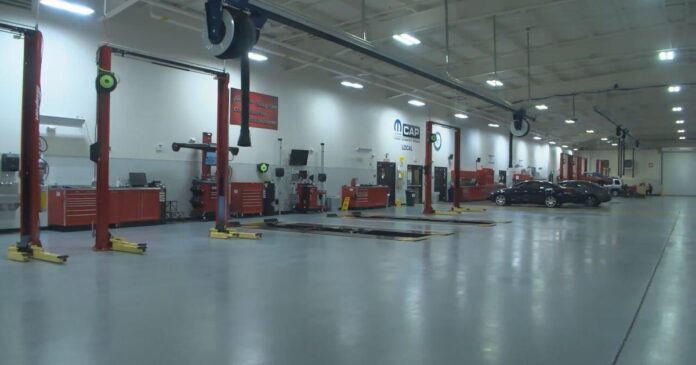Beginning Fall 2025, Linn-Benton Community College will offer an electric-vehicle-focused technician program as they continue to recruit more women into the automotive repair industry.
LEBANON, Ore. – Beginning in fall 2025, the Linn-Benton Community College will be adding a new course to their automotive technician program that will help students focus on adapting to the increase in electric vehicle production.Â
The college’s Advanced Transportation Technology Center in Lebanon currently helps more than 130 students pursue careers in automotive technician/mechanic fields. Mike LeBlanc is the department chair for the program.
“We aim to educate the next generation of automotive technicians. So folks that are going to go work in dealerships, independent shops, maybe own their own shop one day,” LeBlanc said.
The automotive technician program at Linn Benton Community College currently teaches around 130 students that readies them for careers in auto repair
LeBlanc said as they continue to send students into the automotive repair industry, they’re seeing the continued rise of electric vehicles (EVs) leading to major learning curves.Â
âAs the industry has pivoted towards renewable energy and vehicle electrification, we’re noticing a big skills gap, not only in the program but in the industry as well,” he said.Â
LeBlanc said vehicle technology has entered the realm of computers, networking and even cybersecurity. And right now, automotive repair technicians are the ones needing to face those challenges.Â
“From our industry perspective, mechanics and technicians have typically been looked at as very mechanical, even maybe a dirty career, right? Nuts and bolts and grease and fuel,” he said. “As we’re seeing more vehicle technology increasing every year… that’s just ramping up even more as we move towards electric drive technology.”

The Advanced Transportation Technology Center in Lebanon will soon house an EV program that aims to catch students up in electric vehicle repair and technology.Â
That’s why fall 2025 will be the debut term for the new EV-focused automotive technician course at Linn-Benton Community College. There are hopes it will be another opportunity to recruit more women into the industry, which is mostly seen as a male-dominated field.Â
“Depending on where you look, women make up about 2% to 12% of technicians in the automotive repair industry. We’re seeing similar numbers in our programs. We want to see that number grow,” he said.Â
LeBlanc met with students working during the day as technicians at local automotive dealerships.
LBCC auto-technician students Acelyn Parker and Abigael Brown work at a Toyota dealership in Corvallis and said working as women in the automotive repair industry was the right choice for them.

The automotive technician program at LBCC is gearing up ways to recruit more women into the automotive repair industry, as seen on the cover of this brochure.
“It’s mostly the people. They’re really, truly lovely individuals to work with and be around,” Parker said.
“If anything, it feels like I’m more welcome because I’m a girl. And I don’t really feel as if I have to do better. You know, I don’t have to be above everyone to be accepted,” Brown added.Â
Student Maddie Gamache said the EV learning curve is going to be a challenge, but she was glad she would have access to work on EVs should she take the course next year.Â
“I think it’s a big change. And it’s something that even I figure some of the technicians here don’t know,” she said. “I think it’s going to be a big part of our future and a part of this industry.”
Student Kashmir Russell said she plans on taking the EV course.
“I drive a hybrid vehicle. So nobody here in my shop is EV certified. So I personally am interested in doing it because I want to be able to know how to work on those parts of my car because you have to have special equipment and special knowledge. So I’m super excited for it,” Russell said.
“Currently, the only students eligible to take the electronic vehicle courses are students that have already done one year of our program or completed the two-year degree,” LeBlanc said. “As far as the long-term goals, yeah, we hope to increase enrollment in our first-year program so that we can have a pool of more students to pull from. But then also, as we get these classes kind of figured out, we can tweak them, so to speak, so that we can go target industry. So the class for a technician, say, that’s been working in industry for 10 years, but needs to update their skills for EV is going to be a completely different class than what we teach to a 19 or 20-year-old just learning as they go. But that’s the goal for the future is hopefully to have these two options of teach young students, but also offer something to industry locally.”




